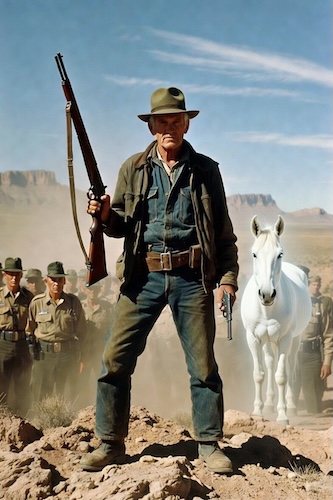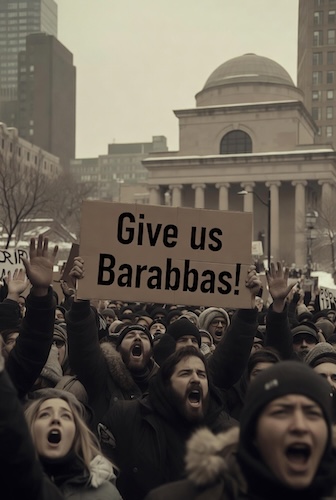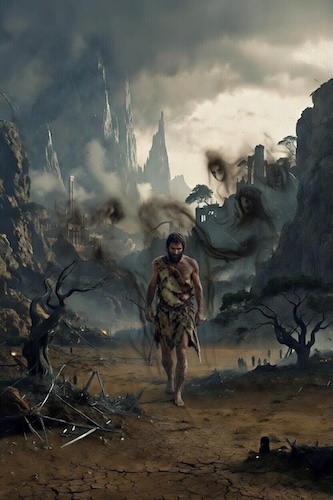
Search
[{{{type}}}] {{{reason}}}
{{/data.error.root_cause}}{{{_source.title}}} {{#_source.showPrice}} {{{_source.displayPrice}}} {{/_source.showPrice}}
{{#_source.showLink}} {{/_source.showLink}} {{#_source.showDate}}{{{_source.displayDate}}}
{{/_source.showDate}}{{{_source.description}}}
{{#_source.additionalInfo}}{{#_source.additionalFields}} {{#title}} {{{label}}}: {{{title}}} {{/title}} {{/_source.additionalFields}}
{{/_source.additionalInfo}}Sunday Morning Musings
This regular column begins today and will continue on Sundays as long as Dan Stewart from Cliff wants to provide them.
- Category: Sunday Morning Musings

Image by Grok
I would like to tell you a story today that came to mind after I wrote the following letter to the editor a few years ago. It went something like this:
Dear Editor,
I must agree with those who have expressed bewilderment as to why the military is using the skies over our wilderness areas for combat exercises. I, as an individual citizen, cannot drive a motorized vehicle into a wilderness area, but a jet can fly in and scare the bejesus out of every living thing in its path, starting wildfires and littering the forest with debris!
My question is this: why not use the White Sands Missile Range for their exercises? That was why it was forcibly taken from ranchers so many decades ago. And a lot of that, I believe, was excessive use of eminent domain to steal private property, but that is a story for another day.
Today is that day.
- Category: Sunday Morning Musings
 Image by Grok
Image by Grok
When Escapism Becomes a Vicious Circle of Life
I've been thinking this week about the strange ways we try to build ourselves up when we're young—how we reach for heroes, philosophies, and identities that promise strength, but often leave us more fragile than before. As you have probably noticed, I often quote C.S. Lewis, and I think it is about time I tell you why. So, as I often do, I'll let C.S. Lewis have the first word:
"Selfish, not self-centered: for in such a life, my mind would be directed towards a thousand things, not one of which is myself. The distinction is not unimportant. One of the happiest men and most pleasing companions I have ever known was intently selfish. On the other hand, I have known people capable of real sacrifice whose lives were nevertheless a misery to themselves and others, because self-concern and self-pity filled all their thoughts. Either condition will destroy the soul in the end. But till the end, give me the man who takes the best of everything (even at my expense) and then talks of other things, rather than the man who serves me and talks of himself, and whose very kindnesses are a continual reproach, a continual demand for pity, gratitude, and admiration."
Reading this reminds me of the feud between Lewis and Ayn Rand. Lewis was highly educated and intelligent, yet humble and realistic about the human condition. Rand, on the other hand, was equally intelligent but conceited and overly cynical. Her stance1 on the virtue of selfishness might have been more meaningful had it been balanced with humility and an awareness of circumstance. In other words, "there but for the grace of God go I."
- Category: Sunday Morning Musings

Image by Grok
"Give us Barabbas!"
Dateline Jan. 2026.. Minneapolis, Minnesota: There's a pattern that repeats itself in every age, as old as Babel and as fresh as this morning's headlines. You can see it in the crowds, in the slogans, in the strange fever that takes hold of otherwise ordinary people. You can see it in the way a single spark of outrage becomes a wildfire, how a chant becomes a creed, how a grievance becomes a god.
We like to imagine that these things are new, that our moment is uniquely unhinged. But Scripture has been telling us the same story since Genesis: the human heart is a restless, fallen thing, and when it gathers with other restless, fallen hearts, it becomes something more dangerous than any one person could ever be alone.
For those of you who have not read Ayn Rand's Atlas Shrugged, I suggest you do. She sketched this truth in the sharp lines of her novel's characters—Wesley Mouch, the bureaucratic opportunist; James Taggart, the moral posturer; Orren Boyle, the crony capitalist; Cuffy Meigs, the brute enforcer. Her prophetic 1957 novel was full of the same characters that are destroying our nation today. Although she was writing fiction in secular form, she was naming what Scripture had already diagnosed.
- Category: Sunday Morning Musings

Image by Grok
Nature and nature's God
I've been thinking this week about a strange irony that C.S. Lewis pointed out. Taking a cue from Paul in 1 Corinthians 1:21, he said the world calls preaching "foolish," yet it is that very "foolishness" that God uses to melt hearts. Shakespeare said it another way: "There are more things in heaven and earth, Horatio, than are dreamt of in your philosophy." The modern mind may smirk at the pulpit, but Heaven smiles at the power behind it.
- Category: Sunday Morning Musings

Image by Grok
East of Eden
How Far Have We Wandered?
Genesis 4 — Adam had known his wife Eve, and she conceived, gave birth to Cain, and said, "I have gotten a man with the help of the Lord." Then she gave birth again to his brother Abel.
And Abel was a keeper of flocks, but Cain was a tiller of the ground. Cain brought an offering to the Lord of the fruit of the ground. Abel also brought the firstborn of his flock and their fat portions. And the Lord had respect for Abel and his offering, but for Cain and his offering, He did not have respect. And Cain was angry, and his countenance fell.
- Category: Sunday Morning Musings

Image by Grok
A Modern Dialogue Between Jesus and Young Scholars at a University
The first skeptical student steps up and asks, "If you're real, why don't you prove it? Why not write your name in the sky or something?"
Jesus answers, "You already trust the sky without seeing the One who holds it in place. You trust the air you breathe without knowing where it begins. Why demand more proof for me than for the things you stake your life on every day? Besides, if my name blazed across the heavens, you would call it a trick, or a glitch, or a hallucination shared by millions. And even if you believed for a moment, you would soon forget—as you did in the beginning—and return to skepticism born of pride. I will not coerce you. Love does not force belief. I only ask you to use the freedom I gave you to choose what is true."
Then skeptic number two asks, "But the world is full of suffering. If you're good, why don't you stop it?"
- Category: Sunday Morning Musings

Image by grok
The Cowboy's Dream
One night, after a long day riding fence, a cowboy fell asleep beside his dying campfire. And as he slept, he dreamed of riding across a vast desert under an iron-colored sky. The wind carried the smell of fire and brimstone.
In the distance, he thought he heard thunder, but it wasn't thunder—it was the pounding of hooves coming from a herd of ghost cattle stampeding across the sky, their horns glowing like embers in a furnace. Behind them thundered ghost riders—gaunt, relentless, with eyes fixed on the horizon. Their ropes swung like lightning, their horses snorted fire, and the cowboy felt the earth tremble beneath him.
- Category: Sunday Morning Musings
 Image by Grok
Image by Grok
Crossroads
Last night I dreamed I was standing at a crossroads. One road wandered downward into a valley of noise, glamor, and crowds—a place where no one ever had to think about what lay beyond the horizon. The other road rose upward, quiet and steep, disappearing into a pale, beckoning light. I could hear and feel the whisper of a steady Wind at my back, gently rustling the leaves scattered along the road ahead of me.
As I hesitated, an old traveler approached—a man whose face was lined with both joy and grief, as if he had walked both roads and remembered every step.
As he came closer, I asked, "Which road should I take?"
Content on the Beat
WARNING: All articles and photos with a byline or photo credit are copyrighted to the author or photographer. You may not use any information found within the articles without asking permission AND giving attribution to the source. Photos can be requested and may incur a nominal fee for use personally or commercially.
Disclaimer: If you find errors in articles not written by the Beat team but sent to us from other content providers, please contact the writer, not the Beat. For example, obituaries are always provided by the funeral home or a family member. We can fix errors, but please give details on where the error is so we can find it. News releases from government and non-profit entities are posted generally without change, except for legal notices, which incur a small charge.
NOTE: If an article does not have a byline, it was written by someone not affiliated with the Beat and then sent to the Beat for posting.
Images: We have received complaints about large images blocking parts of other articles. If you encounter this problem, click on the title of the article you want to read and it will take you to that article's page, which shows only that article without any intruders.
New Columnists: The Beat continues to bring you new columnists. And check out the old faithfuls who continue to provide content.
Newsletter: If you opt in to the Join GCB Three Times Weekly Updates option above this to the right, you will be subscribed to email notifications with links to recently posted articles.
Editor's Notes
It has come to this editor's attention that people are sending information to the Grant County Beat Facebook page. Please be aware that the editor does not regularly monitor the page. If you have items you want to send to the editor, please send them to editor@grantcountybeat.com. Thanks!
Here for YOU: Consider the Beat your DAILY newspaper for up-to-date information about Grant County. It's at your fingertips! One Click to Local News. Thanks for your support for and your readership of Grant County's online news source—www.grantcountybeat.com
Feel free to notify editor@grantcountybeat.com if you notice any technical problems on the site. Your convenience is my desire for the Beat. The Beat totally appreciates its readers and subscribers!
Compliance: Because you are an esteemed member of The Grant County Beat readership, be assured that we at the Beat continue to do everything we can to be in full compliance with GDPR and pertinent US law, so that the information you have chosen to give to us cannot be compromised.
Submitting to the Beat
Those new to providing news releases to the Beat are asked to please check out submission guidelines at https://www.grantcountybeat.com/about/submissions. They are for your information to make life easier on the readers, as well as for the editor.
Advertising: Don't forget to tell advertisers that you saw their ads on the Beat.
Classifieds: We have changed Classifieds to a simpler option. Check periodically to see if any new ones have popped up. Send your information to editor@grantcountybeat.com and we will post it as soon as we can. Instructions and prices are on the page.









